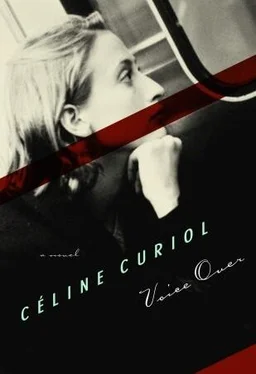Celine Curiol - Voice Over
Здесь есть возможность читать онлайн «Celine Curiol - Voice Over» весь текст электронной книги совершенно бесплатно (целиком полную версию без сокращений). В некоторых случаях можно слушать аудио, скачать через торрент в формате fb2 и присутствует краткое содержание. Год выпуска: 2008, Издательство: Seven Stories Press, Жанр: Современная проза, на английском языке. Описание произведения, (предисловие) а так же отзывы посетителей доступны на портале библиотеки ЛибКат.
- Название:Voice Over
- Автор:
- Издательство:Seven Stories Press
- Жанр:
- Год:2008
- ISBN:нет данных
- Рейтинг книги:5 / 5. Голосов: 1
-
Избранное:Добавить в избранное
- Отзывы:
-
Ваша оценка:
- 100
- 1
- 2
- 3
- 4
- 5
Voice Over: краткое содержание, описание и аннотация
Предлагаем к чтению аннотацию, описание, краткое содержание или предисловие (зависит от того, что написал сам автор книги «Voice Over»). Если вы не нашли необходимую информацию о книге — напишите в комментариях, мы постараемся отыскать её.
Voice Over — читать онлайн бесплатно полную книгу (весь текст) целиком
Ниже представлен текст книги, разбитый по страницам. Система сохранения места последней прочитанной страницы, позволяет с удобством читать онлайн бесплатно книгу «Voice Over», без необходимости каждый раз заново искать на чём Вы остановились. Поставьте закладку, и сможете в любой момент перейти на страницу, на которой закончили чтение.
Интервал:
Закладка:
It’s past ten o’clock: she has been in the café since six. The man has bought her three, perhaps four more glasses of white wine, she has lost count. He never came. She can’t remember exactly when she stopped watching the glass door. But when it occurs to her to look around again, all the faces appear to have changed, without her noticing the bodies those faces belong to come or go. Whether he is in Ange’s arms or lying injured in hospital, she no longer cares. The man has talked a lot about French politics, about globalization, and capitalism in the United States, she can’t remember all the details. He has talked about the younger, very pretty woman he lives with, who has gone away on a trip for a week. She needed to shove off for a while. The expression struck her; she imagines a woman with very long black hair alone in a boat, rowing herself through the water. He has talked about his work as a photographer, about the subjects he prefers to shoot, about his financial problems. Now he asks her if she would agree to pose for him. She starts to giggle; she’s drunk, she knows her face has turned scarlet. I might as well tell you, I’m not going to bed with you. The man bursts out laughing. Men, she reflects, always burst out laughing whenever they are caught out. Nothing could be further from my mind. But she sees that his cheeks have gone red. You have an unusual face. She grimaces. I’m not sure what I see when I look in the mirror, but I think you’re lying. The man smiles, and in that instant she senses that he is happier than he has been in a long time. And what about you, do you lie? That’s my speciality. Everything is a bit blurry around her. She feels rather content to be there. You can’t say no. She is finding it difficult to focus on the man. She should go home. He tells her that he’ll help her find a taxi. Think about it, at least take my card.
He pulls out a small cardboard rectangle from one of his pockets and pushes it across the table. At first, she has a twinge of doubt. She reaches down to the floor, rummages in her bag, and finally extracts a business card, which she lays alongside the other. Identical. The man frowns. He picks the second one up to examine it more closely, looking perturbed. You have my card? I found it in a taxi, Olivier Chedubarum.
She had climbed the stairs and battled to get her key into the lock of the door. The answering machine is flashing. Not bothering to switch on the light, she presses randomly on the machine until the cassette clicks into motion. I’m sorry, I hope you didn’t wait too long for me, something urgent came up at the office, I’m going away for a week, I’ll call you when I get back, I send you kisses. Going away for a week? Where to? Who with? Why? She listens to the message a second time. After the brief explanation he has taken the trouble to give her, she ought to feel reassured. Instead, she feels like throwing up. Rushing to the toilet, she lifts the seat and leans her head over the bowl. She stays like that for one long minute, coughs, spits saliva, sticks her index finger down her throat and waits for a liberating contraction, which doesn’t come. Can’t even just puke. The floor tiles are hurting her knees. Good for nothing that’s what she is. A salty taste of tears reaches the corners of her mouth. She doesn’t know what to do now. Go on waiting, not just for an evening, but for an entire week. She begs God, who doesn’t exist, to make sure that he never comes back.
Out of bed, métro, office, métro, dinner, into bed. Seven times in a row, each one virtually identical. A week spent waiting for him to return, reliving in her head her favorite moments at the café, going through the motions just to keep up a good front.
Sunday. She gets the idea to draw seven lines on one of the walls in the kitchen so she can cross one off at the end of every day, just as she saw it done in an American film. But she can’t find a pencil and worries that if she uses a pen the owner of the apartment will hold back part of her deposit. Afterwards, she forgets to buy the necessary equipment to begin her accounting project.
Monday. Nothing.
Tuesday. At the office, one of her co-workers makes a personal remark to her. It comes from the woman who has been there the longest, the one whose conversation she overheard in the toilets. The day before, Régine was given a gold-mounted diamond from her husband for their twentieth wedding anniversary. Although the two of them never speak, the party in question comes over to show off her jewel and, while she’s at it, inquires about her. No date tonight? The answer flies out of her mouth without a second thought. The diamond would look nicer with the price tag on it. The other woman gives her a withering look, tells her that such bitterness is painful to watch.
Wednesday. She is lying naked on her bed. She looks at her pubic hair and finds it ridiculous to have that much of hair in that particular spot.
Thursday. The telephone rings early in the evening. Wrong number. The man wants to speak to Audrey.
Friday. The telephone remains silent. He has now been gone for a week.
She should call Ange. Ask her if anything has happened, if he’s back, if he’s safe and sound. But she has the feeling that trying to get in touch with him would violate an unspoken rule, one inherent to their relationship. In addition, she would run the risk of losing him if Ange found out what was going on. What is going on? They meet in a café, kiss and touch; they make no plans except to keep doing it, they promise each other nothing. Not much to get excited about. She can’t imagine that Ange, to whom he always returns, the ravishing and divine Ange, could ever become jealous. Would he leave Ange for her? Now and then she tells herself that he might want to, but most of the time she avoids asking herself the question.
She is sitting on the sofa with the telephone on her lap. From time to time, she pretends to dial the number, moving her fingers over the buttons but not pressing down on them. She could always give a false name. She leans down to grab the phone book from under the coffee table, opens it at random, and plants her index finger in the middle of the page. Marie Masson. A petite brunette, sporty, bubbly, early thirties. She grew up in a rather modest family with her brother and sister in the suburbs of Paris. She was an attentive eldest child whose parents continually praised her. Full of determination, she passed her law exams with high honors. She then chose to defend people seeking political asylum in France. She loves her job, would like to have children but is waiting for the right man. Hello, my name’s Marie Masson. Ugh. She shuts the phone book and opens it again at another page. Alice Tournelle. Blonde, tall, and slim, dynamic and ambitious. The only daughter of two Parisian intellectuals, the mother is an anthropologist, the father a journalist. From an early age she showed a genuine talent for the sciences. At twenty-two, she graduated from the École Polytechnique and was immediately hired by the Alcatel Corporation. Within a few years, she was promoted to a position with considerable responsibilities. She earns a good living, goes out a lot, denies herself nothing, has an occasional romantic adventure with one of the dynamic young executives she meets at her business conferences. She has the respect of her subordinates, who consider her kind but firm. Alice Tournelle speaking. The role suits her, but she wouldn’t last five seconds. Last try. Isabelle Léonier. A redhead, obviously, curves in all the right places, gentle features. Married very young to a boy her own age, she was divorced five years later and finished her studies. She is currently working on her philosophy thesis at the Sorbonne. She has many friends, does volunteer work for an NGO, and is mad about rock climbing. It’s Isabelle, Isabelle Léonier.
Читать дальшеИнтервал:
Закладка:
Похожие книги на «Voice Over»
Представляем Вашему вниманию похожие книги на «Voice Over» списком для выбора. Мы отобрали схожую по названию и смыслу литературу в надежде предоставить читателям больше вариантов отыскать новые, интересные, ещё непрочитанные произведения.
Обсуждение, отзывы о книге «Voice Over» и просто собственные мнения читателей. Оставьте ваши комментарии, напишите, что Вы думаете о произведении, его смысле или главных героях. Укажите что конкретно понравилось, а что нет, и почему Вы так считаете.












